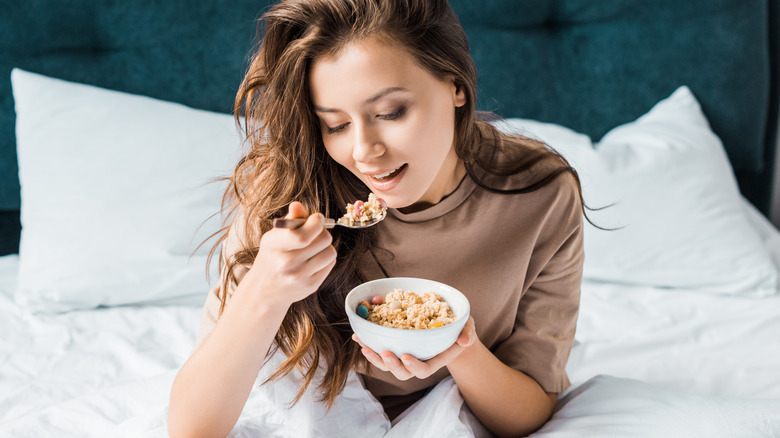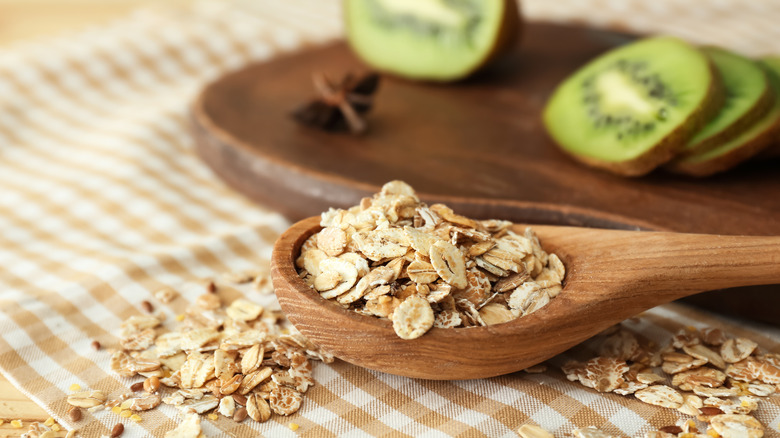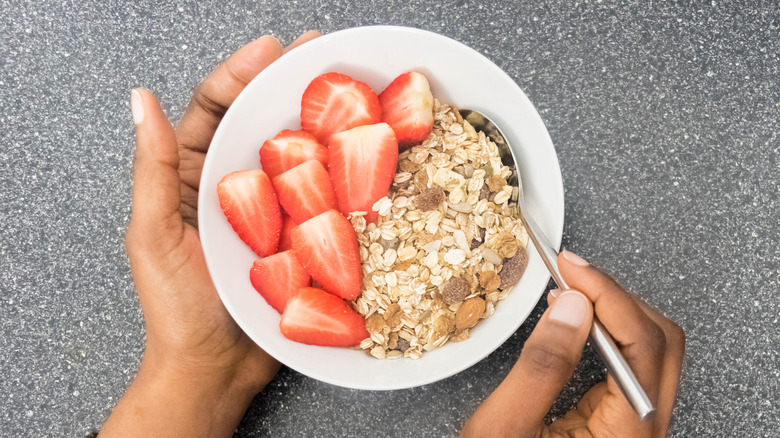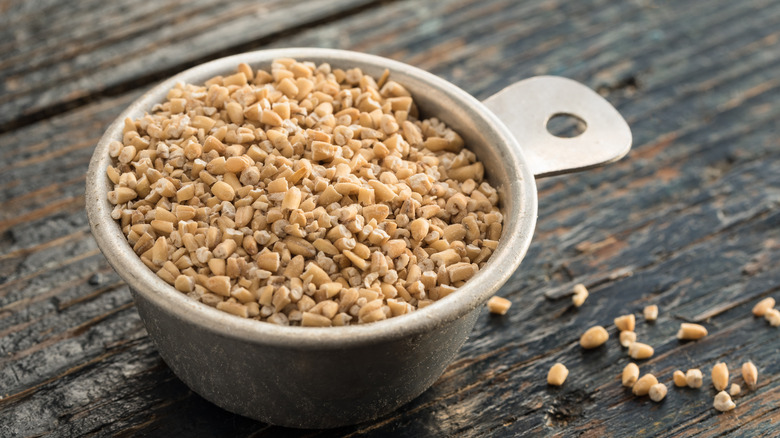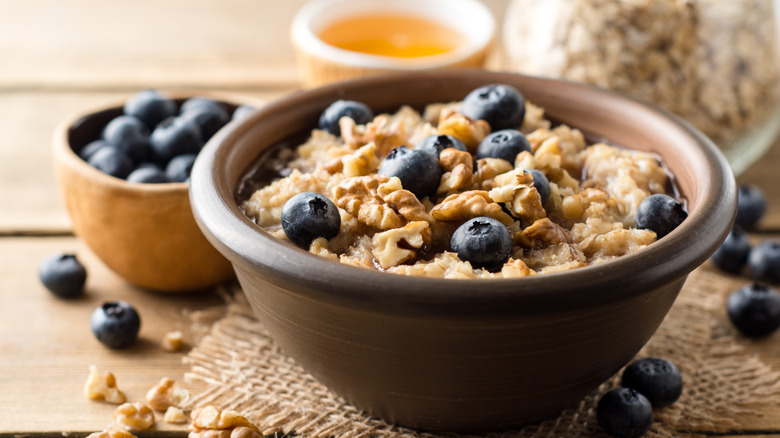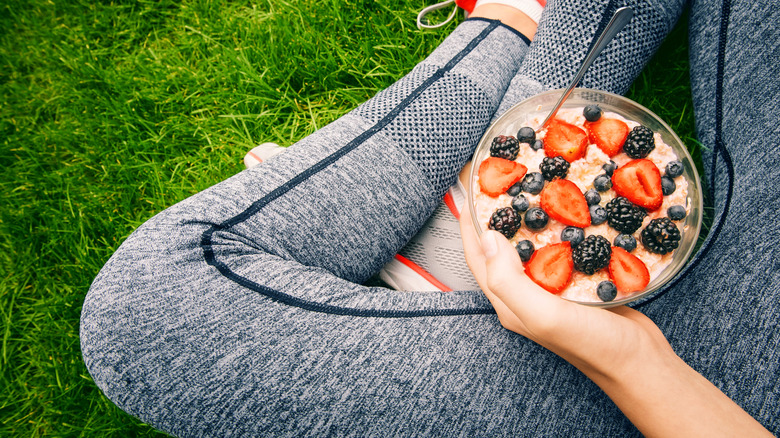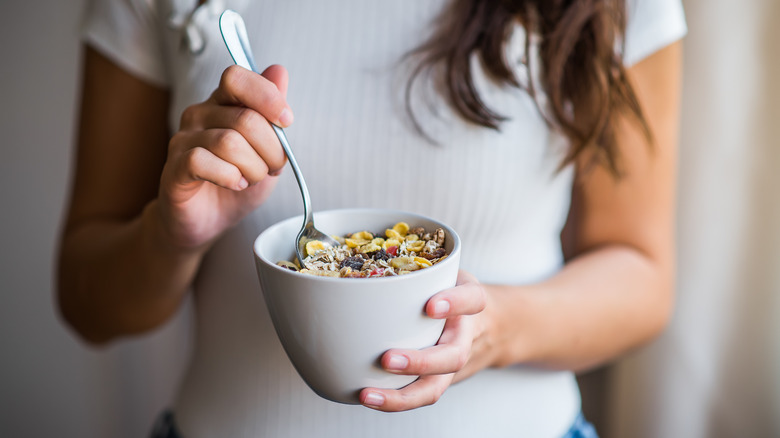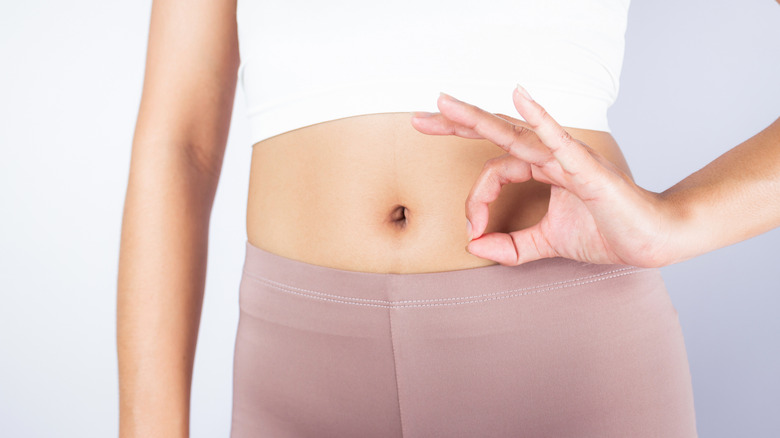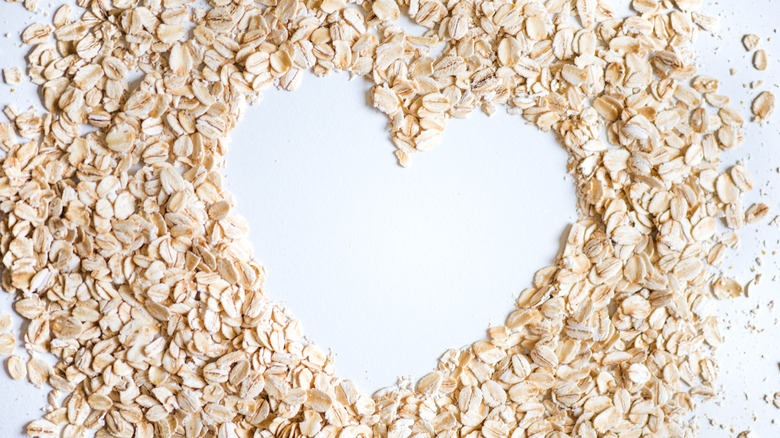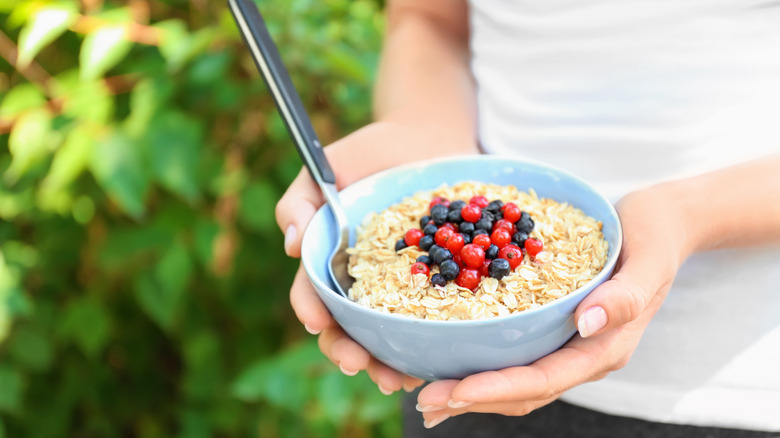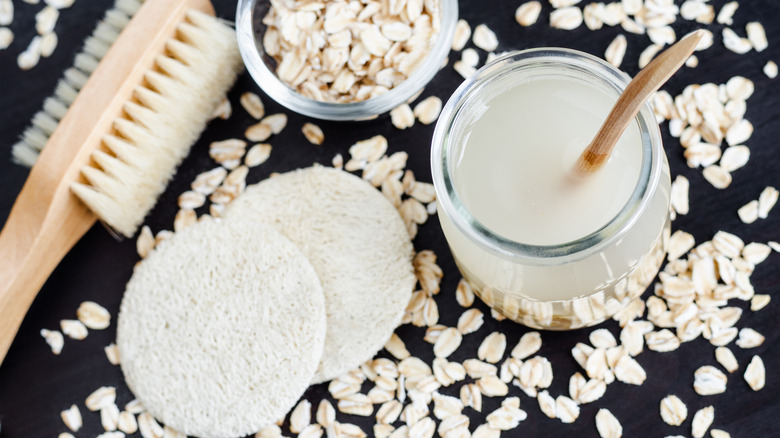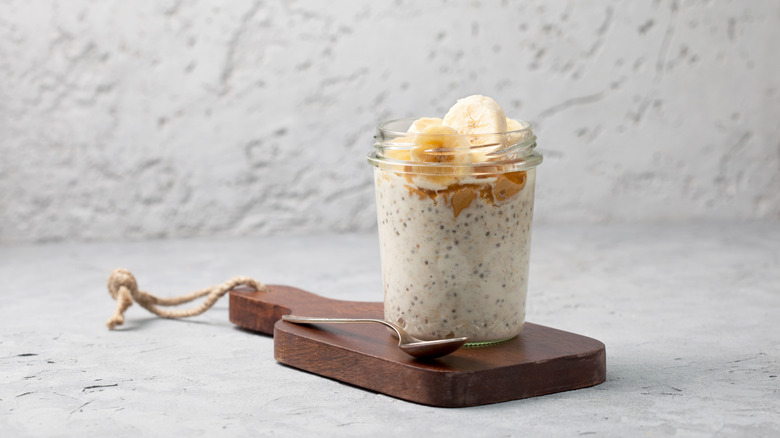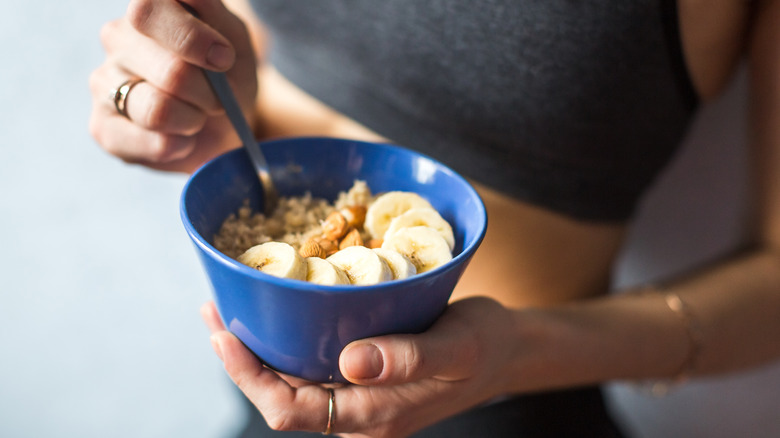What Really Happens To Your Body When You Eat Oats Every Day
A tub of steel-cut oats — or even the more convenient instant rolled oat variety — may not be the most aesthetically pleasing food in the breakfast aisle, but it is hands down the best choice. "I've asked a lot of elite endurance athletes about their breakfast foods, particularly before races, and oatmeal comes up again and again and again," Matt Fitzgerald — endurance coach, nutritionist, and author of The Endurance Diet — told Outside. That's not to say the food is only beneficial to athletes.
The Donnelly family, who achieved the Guinness World Record for the oldest living siblings in 2017, credits oats for their longevity. One of the siblings, Leo Donnelly, revealed in the documentary The World's Oldest Family (via Today) that he and his brothers and sisters each have a bowl of porridge "at around 10 p.m." each night. The next morning, they have another serving of "cooked oats, milk, [and] perhaps a spot of jam on top." Leo said he and his family are "living proof" of the benefits of porridge, but, what actually happens to your body when you, like the Donnelly siblings, eat oats each and every day? We've got the answer.
You'll experience the benefits of antioxidants with bowls of oats
When you think of superfoods, especially ones that are rich in antioxidants, you might think of fruits like blueberries or strawberries. Or maybe you picture greens like kale and spinach. It's true that these are great examples of superfoods, but antioxidants are not confined to just certain fruits and veggies. Oats may be decidedly beige — both figuratively and literally — but this common breakfast food is every bit a superfood.
According to one study published in 2009, oats "contain more than 20 unique polyphenols, avenanthramides, which have shown strong antioxidant activity in vitro and in vivo." Citing several additional studies, Healthline highlighted that avenanthramides increase the production of nitric oxide, which then "helps dilate blood vessels and leads to better blood flow." But that's not all. Avenanthramides even seem to be able to fight inflammation, Shengmin Sang, a food science and human health professor at North Carolina A&T State University, told Time.
A 2010 study conducted by the Molecular Biotechnology Program at the Uppsala University School of Engineering in Sweden confirmed that this unique kind of polyphenol exists "exclusively in oats." So, eat up.
Having oats will up your nutrient intake
Oats aren't just full of antioxidants. A 2012 study revealed that oats "possess a protein quality of high nutritional value." It's more than just protein that makes oatmeal a superfood, though. Registered dietitian Jessica Cording told Women's Health that oats are both a complex carbohydrate and a whole grain, which means they'll "break down more slowly in your body than white rice and white bread." In addition, the dietitian revealed that oats contain iron and B vitamins. And don't forget fiber. Alissa Rumsey, a registered dietitian and founder of Alissa Rumsey Nutrition and Wellness, said fiber is another important part of what makes oats so nutritious.
However, you can negate a lot of the benefits that come from eating oats if you drown your oatmeal in sugar. "Then you're just putting carbs on top of carbs," Cording explained. Instead, she suggested boosting plain oats with flax seed or preparing them with milk as opposed to water. You can even cook in egg whites to up your protein intake even more, according to the expert.
You'll produce more energy by eating oats
Registered dietitian Jessica Cording told Women's Health that oats contain good-for-you iron and B vitamins, but what does that even mean? Let's break it down. According to the Academy of Nutrition and Dietetics, iron's main purpose is to "carry oxygen in the hemoglobin of red blood cells throughout the body so cells can produce energy."
Women aged 19 to 50 need 18 milligrams of iron each day, and, unfortunately, many of us don't get the recommended amount on a daily basis. Thankfully though, oatmeal is here to save the day. One packet of instant oats contains 8.2 milligrams — nearly 46 percent of your daily value — of this energy-producing mineral.
Likewise, B vitamins play an important role in helping your body produce energy. A packet of instant oatmeal contains 22 percent of your recommended vitamin B6 intake. Oats also contain 41 percent of your daily value of manganese, which is — you guessed it — yet another mineral that will help your body produce energy. This basically makes oatmeal the supreme breakfast food.
You'll feel fuller longer if you eat these kind of oats
If you're someone who gets hungry pretty much immediately after eating breakfast, you should consider switching your go-to morning meal to instant oats. In a study commissioned by PepsiCo R&D Nutrition's Quaker Oats Center of Excellence, researchers from the Pennington Biomedical Research Center compared instant oats, old-fashioned oats, and Honey Nut Cheerios cereal and compared the feeling of fullness each produced.
"The researchers found that instant oatmeal improved several measures of satiety, or the feeling of fullness, over a four-hour period more than Honey Nut Cheerios did," Scientific American reported. Instant oatmeal had "greater initial and subsequent viscosity" compared to the cereal, whereas old-fashioned oats had "greater subsequent viscosity but not higher initial viscosity" — which means they weren't as equipped at helping a person feel full.
Basically, all oats contain a fiber called beta-glucan (or β-glucan) — which is what impacts the food's gel-like consistency or "viscosity" — but this fiber "is affected by the manner in which it is processed," the lead author of the study, Candida Rebello, told the publication. If you're looking to stay fuller longer, you'll want to stick with instant oats.
Your metabolism will speed up if you eat oats
If you've been feeling like your metabolism could use a makeover, steel-cut oatmeal may be the ticket. When speaking with She Finds, Jennifer Stagg, a naturopathic physician and author of Unzip Your Genes: 5 Choices to Reveal a Radically Radiant You, recommended readers make steel-cut oats their go-to breakfast.
When eating a complex carbohydrate like oatmeal, your metabolism has the opportunity to run like it's supposed to — like a well-oiled machine. "People who eat good carbs like oatmeal have more energy" and "reduced sugar cravings," Stagg explained when speaking to the publication.
Although you may correlate a fast metabolism with feeling hungry all the time, you don't have to worry about being hangry once your metabolism improves. As highlighted above, oatmeal is still going to keep you full — even the steel-cut kind. Just as the fiber in instant oatmeal will help you stay satiated, the texture of steel-cut oats can actually work to do the same. Because it takes longer to chew, and therefore eat, your body has time to realize when it's full. Who knew oatmeal was this magical?
You may lose weight by eating oats
We all remember the cookie diet, but have you ever heard of the oatmeal diet? According to Healthline, it's an eating plan designed for weight loss. But just because oatmeal is good for you, that doesn't mean you should eat it three times a day for a week — as this plan suggests. "The oatmeal diet is a very low-calorie diet, and some doctors may consider the calorie count to be too low to maintain a healthy diet," the publication revealed. As is the problem with many fad diets, the oatmeal diet is also restrictive.
While you can lose weight by following the plan, simply incorporating oats as your staple breakfast may be enough to help you lose weight, if that is your goal. Because oatmeal keeps you fuller for longer, you may find yourself eating less often and thus experience weight loss, naturopathic physician Jennifer Stagg confirmed to She Finds. In fact, steel-cut oats can actually even reduce your insulin levels — which is great in and of itself — but the reduction in insulin levels can also help shrink fat cells.
Your gut will thank you for eating oats
The fiber called beta-glucan, the gel-like substance that gives oatmeal its gummy texture, isn't just helpful in keeping you fuller for longer. According to Healthline, it also "coats the stomach and digestive tract." Once there, it "feeds good bacteria in the gut, which increase their growth rate and can contribute to a healthy gut." In 2016, researchers based in Norway and Sweden studied the correlation between oatmeal and gut microflora functions. According to the published results of the study, oatmeal seemed to have a positive effect and even "potential prebiotic properties."
Joanne Slavin, a professor of food science and nutrition at the University of Minnesota, told Time, "Fiber is good for so many things throughout the digestive tract." In addition to encouraging the growth of good gut bacteria, fiber also slows down the processing and absorption of food. Our bellies — and bodies — love fiber and, likewise, oatmeal.
Eating oats may improve your colon health
What goes in must come out, and oats have proven to be helpful even in the colon department. Because of the fiber content, oats promote healthy stool, Joanne Slavin, food science and nutrition professor at the University of Minnesota, told Time.
In fact, Healthline dubbed oat bran, which is the outer part of the oat grain, a "natural laxative" because of its remarkable fiber content. A 2009 study proved that oat bran rivals many over-the counter laxative treatments as 59 percent of seniors at a geriatric hospital were able to stop using over-the-counter treatment with the addition of oat bran to their diet.
Even if you don't have issues with constipation, though, oats are still worth adding to your diet. One study published in 2014 found that oats "may protect against colorectal cancer and have benefits on inflammatory bowel disease and coeliac disease."
Your bad cholesterol will go down if your regularly eat oats
So, the doc informs you that you have high cholesterol: what do you do? Eat oatmeal, of course. In 1997, the FDA awarded the heart-healthy label to oats. "There is scientific agreement soluble fiber from oat products when added to a low-saturated fat, low-cholesterol diet may help reduce the risk of heart disease," Ed Scarbrough of the FDA told CNN at the time. In the years since, oats remain a heart-healthy, cholesterol-lowering superfood.
It's true that oats aren't the only food that can help you lower your cholesterol, but they are particularly amazing at it. According to the Mayo Clinic, the soluble fiber in oatmeal "reduces your low-density lipoprotein (LDL) cholesterol" — aka your "bad" cholesterol. This same fiber can also "reduce the absorption of cholesterol into your bloodstream."
In order to successfully reduce your cholesterol, though, you'll need to consume anywhere from five to ten grams of soluble fiber per day. A half cup of oatmeal will get you pretty close to that number at four grams per half-cup serving. Add in a banana, and you'll have easily eaten seven grams before you're even hungry for lunch.
You'll have a reduced risk of lung disease if you eat oats
Although you probably won't see a lung-healthy label on a box of oatmeal anytime soon, oats are arguably as great for your lungs as they are for your heart. Back in 1985, researchers recognized that the beta-glucan found in oats could "have beneficial effects on the initiation and growth of tumors." A much later study published in the British Medical Journal (via Express) in 2015 confirmed that oats can indeed help stave off chronic lung disease.
Contrary to what some may assume, lung disease isn't just something that affects people who smoke or have smoked. A third of people with lung disease have never smoked, which means quitting smoking to improve lung health is not an option for everyone. Adding oats, as well as some other superfoods to your diet, can be a great preventative measure to take, as noted by Express. Nutritionist Juliette Kellow advised aiming for "three portions a day" of whole grains.
With oats, your skin will improve
You may find that many carb-laden foods like muffins cause your skin to break out. This is because of their high glycemic index, dermatologist Whitney Bowe told Reader's Digest. "They promote the release of an insulin-like hormone called IGF-1 (insulin-like growth factor 1), which works to reproduce and regenerate cells. But if you have too much of it, it can work against you by fueling the biological cascades that ramp up inflammation and lead to certain diseases, such as cancer, and skin disorders, such as acne." If you switch out, say, your morning bagel for a bowl of steel-cut oats — a food with a low glycemic index — you might just find that your skin improves.
You can also apply oatmeal directly to your skin for added benefits. If you whip up a mask using the whole grain, you'll be able to cleanse, moisturize, and even repair your skin, New York-based dermatologist Amy Wechsler revealed to ShareCare. How many other foods can do that?
Oats may help stabilize your blood sugar
The low glycemic index of oats isn't just great for your skin; it — along with fiber — can also help regulate your blood sugar, according to Healthline. Oatmeal is arguably beneficial to everyone, but it's this aspect that makes oats especially helpful for those with diabetes. As the National Institute of Diabetes and Digestive and Kidney Disease (NIDDK) explained, having diabetes puts a person more at risk for developing heart disease and increases the chances of having a heart attack. Because oats can not only lower a person's blood sugar but also their cholesterol, it's heart-healthy in multiple ways.
Diabetics who are insulin-dependent may even find that they can reduce the number of insulin injections needed when they start eating oatmeal, Healthline revealed. Whether you have a metabolic condition or not, though, the NIDDK recommends eating "whole grains, like oatmeal," as well as other "nutrient-rich foods" to live a healthy life.
Your muscles will get stronger with regular helpings of oats
Athletes and body-builders swear by oatmeal because of its muscle-building properties. "One cup of oats provides 166 calories, four grams of fiber, six grams of protein, and eight vitamins and minerals," Brian St. Pierre, a registered dietitian and nutrition coach for Precision Nutrition, told Men's Journal. "And it's a slow-digesting carb." This means it's going to give you long-lasting energy, not a quick boost and then subsequent crash like that shot of espresso would.
When it comes to protein especially, oats are definitely the frontrunner. According to the University of Nebraska-Lincoln (via Livestrong), oats contain more protein than any of the other common grains. You can see why St. Pierre said he recommends starting the day with a bowl of oatmeal to help men develop strong muscles.
Of course, this isn't just specific to men wanting to bulk up. Gwen Jorgensen, a professional triathlete, told Running on Veggies that she added larger meals — including a giant bowl of oatmeal each day — to her diet at the suggestion of a nutritionist. And, well, she went undefeated 12 consecutive times in 2014 and 2015. Just saying.
You'll feel better overall after eating oats
Although your diet shouldn't solely consist of oatmeal, it's glaringly obvious that oats are pretty much the be-all and end-all superfood. Sure, a gloppy bowl of plain oats isn't exactly as sexy as a smoothie bowl, but don't underesthimate its powers. Ahem, its superpowers.
In an article for Spoon University, Stephanie Zajac detailed what it was like to eat oatmeal every day for 14 days. By the last day, she said she was feeling good or, rather, "feeling gooooood." She wrote, "After eating oatmeal everyday for two weeks, my body feels different... in a good way. My meals are spaced out better, and I feel lighter on my feet throughout the day. Usually after a big breakfast, I feel weighed down, but after two weeks of establishing this oatmeal routine, I usually have a much better start to my day."
Because oatmeal positively impacts so many parts of the body, it's not hard to see how a simple bowl of oats could help you feel better overall. Of course, there's no way to know exactly how you'll feel unless you add oatmeal to your diet. Grab that spoon and dig in.
